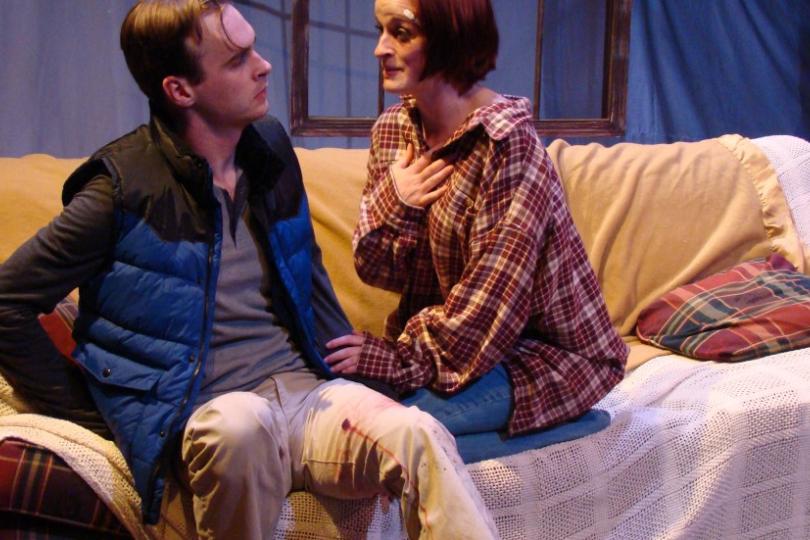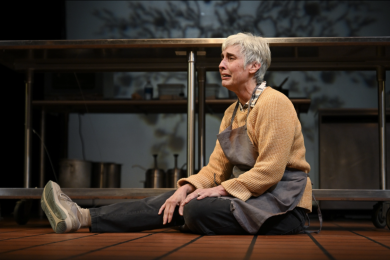Mind games

The latest from Theatre Pro Rata, A Lie of the Mind is a 1985 Sam Shepard play centered on white maleness, insecurity, and violence. When Jake beats his wife (Beth) and runs, both rejoin their families to wrestle with the depths of their relationship, their needs for trust and security, and their expectations rooted in gender roles. As Director Carin Bratlie Wethern describes in her Director’s Notes, the piece “depicts the breakdown of the American nuclear family and his exploration of the continuously lost American male.” Standout performances in this production include Kit Bix as Lorraine, Joy Dolo as Sally, Don Maloney as Baylor, and Amy Pirkl as Beth.
Nearly thirty years later, Shepard’s writing still fuels debate over gender norms and gender roles. Even after Jake’s horrific abuse of his partner, his mother (Lorraine) rushes to his defense: “A woman who lives with a man like that deserves to be killed.” Her unflinching protection of her son contrasts with her damning blame of her daughter, Sally. Decades after her husband’s death, Lorraine still sculpts her life around his absence, merely transplanting her son Jake as her new center of gravity. Kit Bix as Lorraine captures the fervent blind-sightedness of an earnest mother in her haggard shout, “Is there a good reason in this Christ-less world why men leave women?” Her tired eyes, scratchy maternal obstinance, and resolute faith in her son buoy her above Jake’s conniving rants and manic obsessions.
Sally too lives at the mercy of Jake’s behavioral swings and fits of mania, unsure of his intentions and sincerity at every turn, but still choosing to blindly trust in her violent and jealous brother. In a heated and riveting scene with Lorraine, Sally (played by Joy Dolo) weeps as she relives her female helplessness at seeing Jake’s cruelty unbridled.
But why? Why does Shepard create women who shape their entire lives around men with such absurd devotion? What does that clever playwright hope to reveal about how we assume women and men understand dependency differently? And what of those moments of sharp observation each woman demonstrates when least expected?
The heart has truths. . .
Recovering from severe brain damage, a badly beaten Beth (played by Amy Pirkl) utters keen truths of the men in her life. Of her husband, Jake, she screams with heartfelt despair: “He is my HEART!” To her brother, Mike: “You are not the guard of me.” And, most cuttingly, of her father: “He’s given up love. Things live for him to be killed. Only death counts for him.” Curiously enough, Beth walks a line along this artificial gender binary, revealing her own coded assumptions of power and dominance with maleness, of submission and vulnerability with femaleness.
Maloney as Beth’s father embodies traditional white American masculinity in all its tropes: a sneering distaste for the highly educated (“What I know? I’m just a rancher!”), a resounding pride in hunting deer, a fervent devotion to the American flag (“Don’t let it touch the ground!”), and a patronizing dismissal of his spouse, Meg. His explosive temper, artfully mixed with layers of weakness and insecurity and fear, cast both terror and pity in the audience. His gruff exterior masks his reliance upon the women for purpose, a familiar scene in the familial politics of today.
While the two storylines surrounding Beth and Jake only intersect at the end of the show, the actors turn towards one another throughout the performance, reminding us of the haunting imprints we leave upon one another as we obsess and over-analyze and lie and lust. Bratlie Wethern’s blocking blurs the line between memory and fantasy, contributing to the confusion between illusion and delusion integral to Shepard’s piece.
But the climax. . .
With such strong performers at work, I wish I felt the show culminate emotionally; yet the final scenes felt clumsy and hurried, emotionally jarring, and very confusing. Dolo and Bix argue so honestly and painfully that seeing their characters magically repair their relationship seemed hard to swallow. The other storyline lurched towards individual points of hysteria, teetering unconvincingly at the seams, succeeding only in posing more questions than it answered. But such is the risk of attending opening night performances: productions are living breathing beasts with eyes for improvement and hearts for truth, so this piece will likely evolve past such quibblings.
Well over two hours long, this Theatre Pro Rata production challenges the relationship between hunter and prey, man and woman, lie and reality. How much of white male rage stems from insecurity and confusion? To what extent are women complicit in a patriarchal society? (Is there room for non-gender binary-conforming narratives in Shepard’s world at all?)
And which is more deadly: The truth about ourselves and our pasts? Or the lies we tell ourselves to assuage our guilt and shame?




